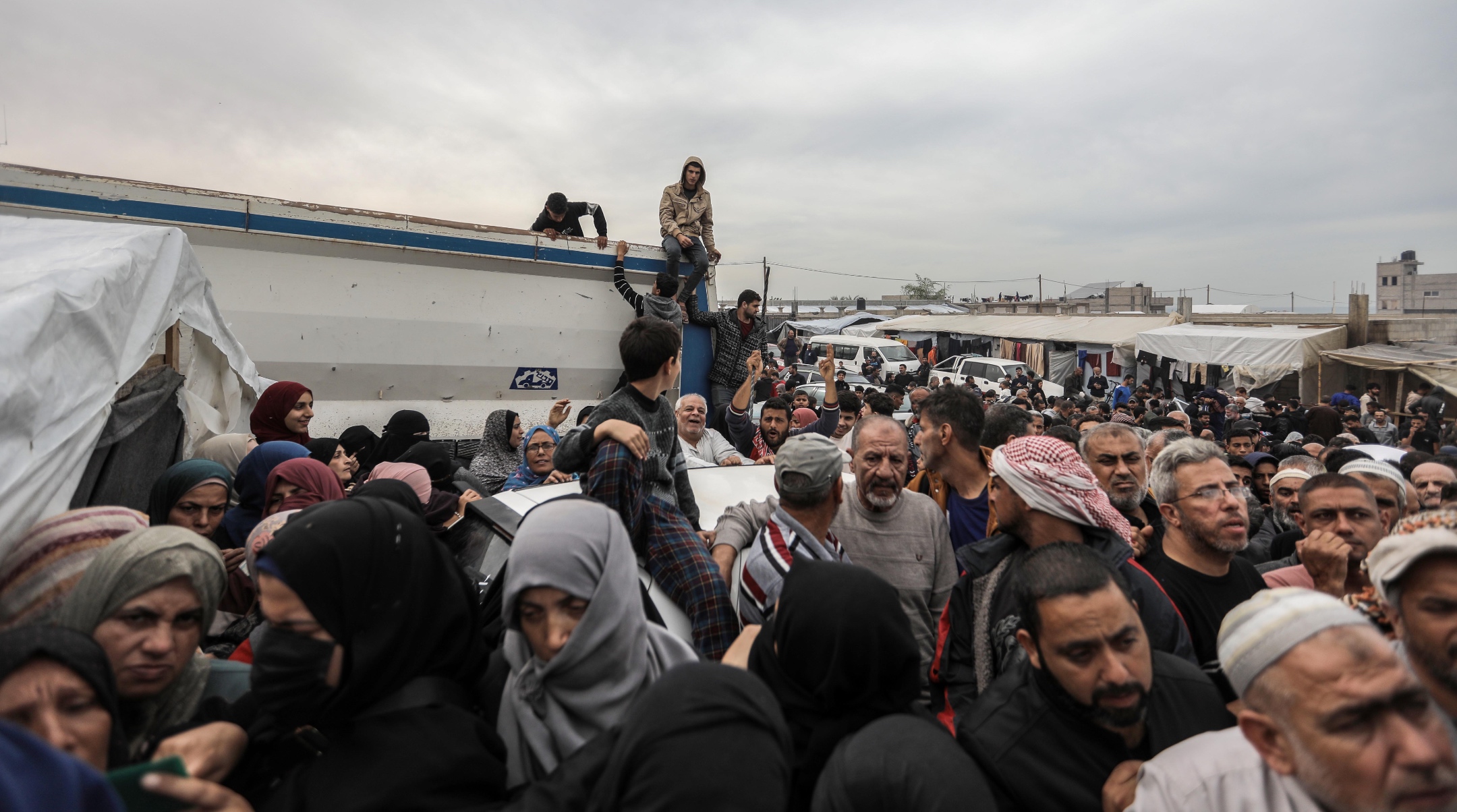Victims of Oct. 7 attack sue UNRWA for allegedly laundering money for Hamas
The lawsuit is the latest in a string that victims have launched in U.S. courts since Oct. 7.

UNRWA distributes flour to Palestinian refugees in Khan Yunis, Gaza Strip, Nov. 22. Photo by Ahmad Hasaballah/Getty Images
(JTA) — More than 100 victims of Hamas’s massacres in Israel on Oct. 7 are suing UNRWA, the main relief agency for Palestinian refugees and their descendants, saying it effectively laundered money for the terrorist group, the latest in a spate of lawsuits launched in U.S. courts since the Israel-Hamas war started.
The lawsuit filed Monday in federal court in the Southern District of New York alleges that the U.N. Relief and Works Agency assisted Hamas in, among other ways, building the infrastructure it required to launch the war, in subsidizing Hamas by paying its activists as employees, and in relaying Hamas propaganda through its schools.
“The terrorist who held me hostage for 53 days worked as a school teacher for UNRWA,” Ditza Heiman, one of the hostages, said in a statement. “The fact that Hamas controlled Gaza was not an excuse for UNRWA to hire and fund terrorists, but instead should have ensured UNRWA took extra precautions. ”
UNRWA did not respond to requests for comment. Its spokespeople have previously accused Israel’s government and its allies of seeking to dismantle the agency as a means of pressuring Palestinians and diminishing Palestinian claims to national redress.
Notably, however, the litigants in this case include families who have been harshly critical of how Prime Minister Benjamin Netanyahu has handled the war and the negotiations for hostages held by Hamas.
“There is no pain in the world that compares to burying your children and grandchildren who were murdered and suffocated in their own home,” said Gadi and Reuma Kadem, whose children and grandchildren were killed in the 7 October attacks and who scuffled with Israeli right-wingers at a recent protest calling for a ceasefire. “All funders of Hamas — UNRWA and its directors are major players — are fully complicit in the murder of my children and family.”
The plaintiffs are represented by MM-Law, an outfit that has for years sued — often successfully — institutions accused of profiting from terrorism, torture, genocide and other human rights abuses.
There have been multiple lawsuits filed by Oct. 7 victims against U.S. and international organizations alleged to have been profited from the attacks or to have colluded with banned terrorist groups.
In January, 67 people including some former hostages and people injured on Oct. 7 filed a federal lawsuit accusing Iran of masterminding the attack on Israel.
A federal lawsuit filed in Florida in February accuses the Associated Press of paying for photos by photographers who knew of the planning for the attacks. AP says the lawsuit is baseless and that there is no evidence that the freelancers had prior knowledge of the attacks.
A separate lawsuit filed by victims of the attacks last month in Virginia alleges that American Muslims for Palestine and National Students for Justice in Palestine are propagandists for Hamas. AMP has said the lawsuit is baseless and a bid to distract from Israel’s retaliatory actions in Gaza.
Also last month, Oct. 7 victims filed a federal lawsuit in Delaware against UNRWA-USA, an independent nonprofit that raises money for UNRWA. UNRWA-USA has said that the lawsuit is not aimed at winning in the courts but at draining resources of groups that deliver assistance to Palestinians.
Human rights groups in the 1980s dusted off centuries-old statutes to sue institutions that are based in the United States or have U.S. ties and that are connected to terrorist groups and human rights abusers as a means of redress for acts that the U.S. government is either unable to pursue, or unwilling to, for diplomatic reasons. Some of the first targets were Latin American autocrats who had money in the United States and who were allied with the Reagan administration.
In the 2000s, victims of Palestinian terrorism during the second intifada seized on the strategy, yielding mixed successes. In one landmark case, which took more than a decade to make its way through the courts, a jury ruled that the Arab Bank must pay damages to hundreds of victims of terrorism in Israel; the verdict was later overturned although some payments were still disbursed.
In another dramatic case, a U.S. court ruled in 2017 that Iran and Syria must pay nearly $180 million to the family of an American-Israeli infant killed in a Hamas terrorist attack in 2014 in Jerusalem.
Nitsana Darshan-Leitner, an attorney who heads the Shurat HaDin Israeli Law Center, was instrumental in that case and others. In December, she said she was working with American plaintiffs on a possible lawsuit in response to Oct. 7 — against North Korea, for allegedly indirectly supplying weapons to Hamas.

















